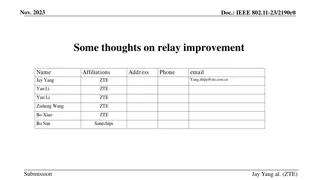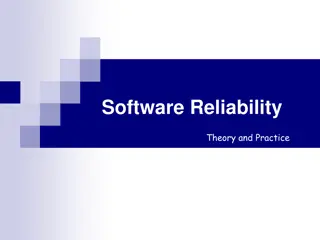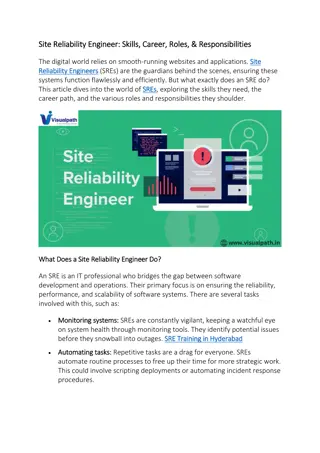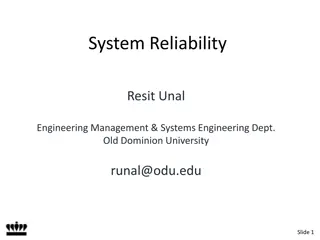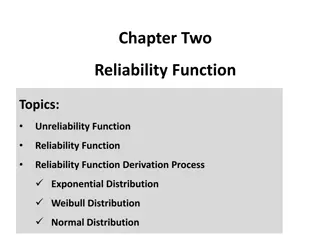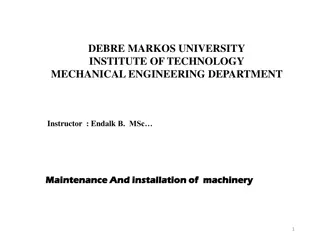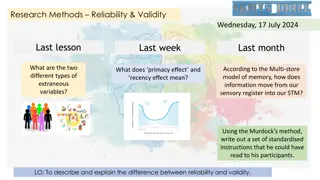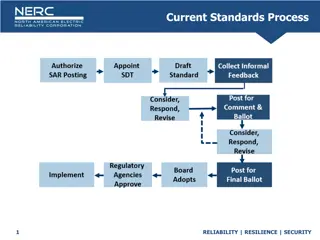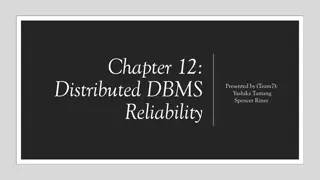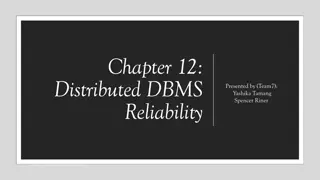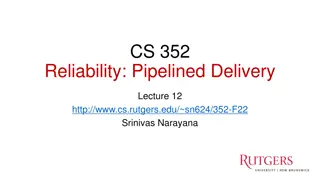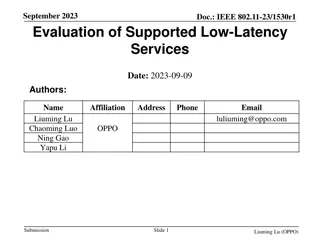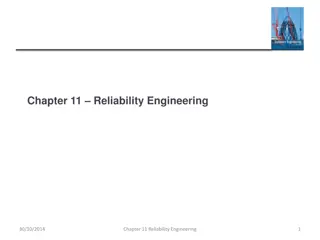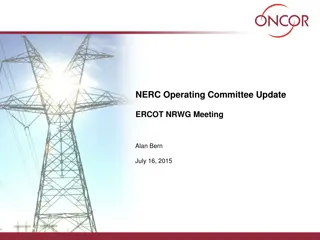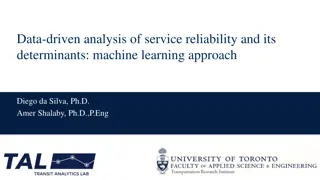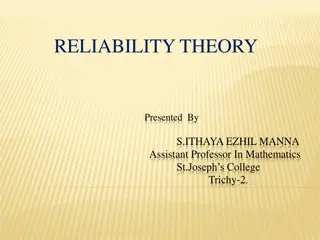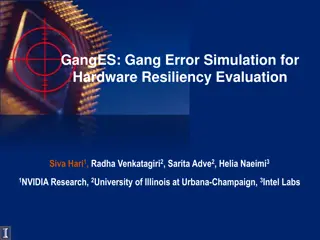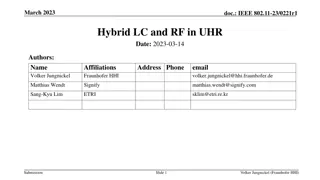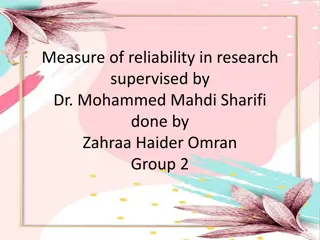Software Engineering and Architecture
Reliability in software systems is crucial, as defects can lead to failures impacting reliability. The number of defects directly affects the system's reliability. Not all defects are equal, so prioritizing defect correction based on return on investment is essential. Testing thoroughly, especially
1 views • 40 slides
Actions Emanating from the Evaluation of the Governance Reform
The evaluation of the governance reform within the WMO aimed to assess its alignment with strategic objectives, effectiveness in responding to societal needs, coordination efficiency, decision-making process, agility, and more. Evaluation criteria included relevance, design validity, effectiveness,
1 views • 13 slides
Enhancing Wi-Fi Relay Networks for Improved Coverage and Reliability
This document discusses the need to enhance relay frameworks in Wi-Fi networks to improve coverage, reliability, and performance of stations in different ranges. It highlights the challenges of S1G-based relays, proposes enhancements to the relay framework, and introduces new types of relay framewor
1 views • 12 slides
Understanding Software Reliability Metrics
Software reliability is a vital aspect of system quality, ensuring that systems behave as expected and operate without frequent failures. Key concepts include fault, failure, and different time intervals like MTTF, MTTR, and MTBF. By measuring and understanding these metrics, we can assess the relia
1 views • 21 slides
DRRS Design to Meet HB1500 Intent
DRRS design aims to meet the requirements of HB1500 in determining the quantity of services needed for reliability standards in ERCOT grid operations. The primary goal is to ensure operational reliability during extreme events with a focus on dispatchable generation facilities. DRRS resources must b
0 views • 6 slides
Site Reliability Engineering Online Training | Hyderabad
Visualpath offers an effective Site Reliability Engineering Online Training Program. To schedule a free demo, simply reach out to us at 91-9989971070.\nVisit \/\/ \/site-reliability-engineering-sre-online-training-hyderabad.html\nWhatsApp: \/\/ \/catalog\/919989971070\/\n
0 views • 9 slides
Site Reliability Engineering Training Institute in Hyderabad - SRE
Visualpath provides the best SRE Training Course in Hyderabad by real-time experts we are providing a Site Reliability Engineering Course that is available globally in India, the USA, the UK, Canada, Dubai, and Australia To book a demo, please get in touch with us at 91-9989971070.\nVisit \/\/ \/si
2 views • 3 slides
Universal Evaluation Framework: Simplifying Evaluation Processes
This session introduces the Universal Evaluation Framework (UEF) developed for evaluating QAA Scotland Enhancement Themes. Participants learn key evaluation questions, evidence capture, and the Theory of Change to enhance evaluation confidence. The QAA Scotland Evaluation Odyssey details historical
2 views • 14 slides
Implementing Blind Evaluation Pilot in HORIZON EUROPE: Key Facts and Process
HORIZON EUROPE is conducting a pilot on Blind Evaluation in the 2023-2024 work program to address biases in the research and innovation evaluation process. The pilot aims to assess the feasibility of blind evaluations in ensuring fairness and mitigating potential biases towards well-known organizati
9 views • 9 slides
Understanding System Reliability in Engineering
System Reliability in Science/Engineering involves understanding how products/systems work, as well as the ways they fail and the effects of failures. Reliability is the probability that a system will perform as expected under given conditions and play a crucial role in the design phase to mitigate
0 views • 19 slides
Understanding Reliability Functions in Data Analysis
Reliability functions play a crucial role in data analysis, providing insights into the probability of success or failure over time. This chapter delves into topics like unreliability functions, derivation processes for reliability functions using distributions like exponential, Weibull, and normal.
0 views • 19 slides
Understanding Reliability in Mechanical Engineering
Reliability in mechanical engineering pertains to the ability of a product to perform as expected over a specified period under defined operational conditions. This article delves into the factors influencing reliability, such as numerical value, intended function, product life, and operating condit
0 views • 61 slides
Reliability and Failure Analysis in Engineering Systems
Introduction to failure data analysis, goodness of fit testing, stress-strength modeling, and reliability evaluation in engineering systems. Learn about failure rate estimation, MTBF/MTTF calculations, and practical examples illustrating reliability metrics in industrial applications.
0 views • 27 slides
Exploring Developmental Evaluation for Better Decision-Making
Delve into the realm of developmental evaluation, focusing on its purpose, principles, and application in practice. Understand how developmental evaluation emphasizes real-time data collection for informed decision-making in complex systems. Learn about key principles such as developmental purpose,
0 views • 25 slides
Understanding Research Methods: Reliability and Validity in Psychological Studies
In psychological research, understanding reliability and validity is crucial. Reliability refers to consistency in measurements, while validity focuses on whether the results accurately represent the phenomenon being studied. Ensuring both reliability and validity enhances the credibility of researc
0 views • 13 slides
Current Standards Process for Reliability, Resilience, and Security
The current standards process focuses on ensuring reliability, resilience, and security in regulatory directives. It involves remanding standards to committees, convening technical conferences, re-ballingoting within 45 days, and considering input for further work. The process also covers the initia
1 views • 8 slides
Enhancing Evaluation Capabilities in Mongolia for Agenda 2030
The Mongolian Evaluation Network in collaboration with UNDP is working to integrate the 2030 Agenda into national strategies and plans, establish institutional coordination mechanisms, align budgets, and enhance data monitoring systems. Key stakeholders including government agencies, NGOs, and inter
0 views • 9 slides
Distributed DBMS Reliability Concepts and Measures
Distributed DBMS reliability is crucial for ensuring continuous user request processing despite system failures. This chapter delves into fundamental definitions, fault classifications, and types of faults like hard and soft failures in distributed systems. Understanding reliability concepts helps i
0 views • 58 slides
Distributed DBMS Reliability Overview
This chapter delves into the critical aspect of reliability in distributed database management systems (DBMS). It explores the concepts, measures, types of faults, and the significance of maintaining atomicity and durability properties of transactions in ensuring system reliability. The narrative hi
0 views • 51 slides
Understanding TCP Reliability and Pipelined Delivery
This lecture delves into the concepts of TCP reliability and pipelined data delivery, emphasizing the need for mechanisms to ensure data integrity and accuracy. It covers error detection, handling delayed and dropped packets, setting retransmission timeouts (RTO), coping with packet duplication and
0 views • 35 slides
Understanding Evaluation in Education
Evaluation in education is a comprehensive term that encompasses measurement, testing, and qualitative examination of student behavior. It involves both quantitative and qualitative descriptions, along with value judgments. Differentiating from mere measurement, evaluation provides a deeper analysis
0 views • 28 slides
Evaluation of Low-Latency Services in IEEE 802.11-23/1530r1
This document discusses the evaluation of supported low-latency services in the context of IEEE 802.11-23/1530r1, focusing on the reliability of WLAN, throughput, latency, and MPDU loss. It addresses the challenges in supporting new low-latency services such as AR/VR and industrial IoT, particularly
1 views • 11 slides
Sustainable Evaluation Systems Workshop Summary
Workshop on Sustainable Evaluation Systems by Stephen Porter at the NEC Conference focused on defining evaluation systems, addressing their failures, and emphasizing the importance of quality, use, and networks in achieving sustainability. Participants engaged in activities such as bingo card introd
0 views • 38 slides
Impact and Evaluation Toolkit for Churches and Christian Charities
This toolkit aims to equip churches and Christian charities engaged in small-scale social action projects to think about impact, measure impact, choose data tools, reflect on evaluation data, and use it effectively. It covers principles of evaluation, setting objectives, selecting indicators, storyt
0 views • 34 slides
Overview of Monitoring and Evaluation in the GEF
The Evaluation in the GEF and Training Module focuses on promoting accountability and learning within the Global Environment Facility (GEF) through monitoring and evaluation activities. The GEF Independent Evaluation Office plays a crucial role in assessing results, effectiveness, and performance of
0 views • 25 slides
Jordan Atomic Energy Commission Human Reliability Program Overview
Explore the comprehensive Human Reliability Program implemented by the Jordan Atomic Energy Commission for the Research and Training Reactor facility. The program focuses on nuclear security, physical security, cyber security, and fostering a culture of reliability and trustworthiness among employee
5 views • 25 slides
Understanding Software Reliability Engineering Concepts
Explore the key topics of availability, reliability requirements, fault-tolerant architectures, and programming for reliability in software engineering. Learn about different types of faults, errors, and failures, along with strategies for fault management and avoidance to enhance software dependabi
0 views • 83 slides
Developing an Evaluation Work Plan for Effective Program Assessment
This presentation by Amy D. Andrade from San Jose State University focuses on developing an Evaluation Work Plan to identify responsibilities and timelines. It covers topics such as Evaluation Coaching Support, Webinar Outlines, Logic Model, Inputs-Outputs-Outcomes, Two Approaches to Evaluation, Pro
0 views • 29 slides
NERC Operating Committee Update & Strategic Plan Overview
The NERC Operating Committee (OC) oversees critical operational reliability matters within the electricity sector, aligning with the organization's strategic plan for the next five years. Led by Chair Jim Case and Vice-chair Lloyd Linke, the OC collaborates with various stakeholders, focusing on eme
0 views • 15 slides
Evaluation Synthesis in Changing Contexts: Enhancing Knowledge for Development Effectiveness
Evaluation synthesis is crucial for promoting learning, reflection, and decision-making in development work. This process involves bringing together diverse knowledge sources to generate strategic insights and facilitate wider use of evaluation findings. The Independent Office of Evaluation of IFAD
0 views • 20 slides
Evaluation of FME Zero Emission Neighbourhoods in Smart Cities
The mid-term evaluation process of FME Zero Emission Neighbourhoods in Smart Cities involves self-evaluation, partner evaluation, and panel evaluation. The procedure includes scientific review, evaluation by scholars, and innovation assessment. Key documents like self-reports, progress reports, and
1 views • 20 slides
Overview of Regular Evaluation 2017 Findings in Estonia
In the Regular Evaluation 2017, efforts were made to maximize the benefits of evaluation outcomes for various stakeholders in Estonia such as the state, society, and institutions. The evaluation focused on a range of actions including preparing legislation, finding experts, creating self-report form
0 views • 6 slides
Comprehensive Guide to Training Evaluation Methods
This detailed guide covers the aim of evaluation, evaluation methods, techniques of evaluation, types of evaluation (formative, process, outcome, impact), and the significance of formative and process evaluation in assessing training effectiveness. Learn about the key principles and practices involv
0 views • 45 slides
IEEE 2018 Emerging Technologies Reliability Roundtable Summary
The IEEE 2018 Emerging Technologies Reliability Roundtable took place in Austin, Texas, featuring speakers from various technology companies discussing topics such as software reliability, 5G network challenges, and ultra-reliability in wireless communication. The agenda included insightful talks, Q
0 views • 11 slides
ACE RAM Workshop - Barcelona 2019: Reliability and Maintenance Concepts
The ACE RAM Workshop conducted by George Pruteanu in Barcelona focused on topics such as RAM prediction, FMEA, maintenance concepts, preventive and predictive maintenance, condition monitoring systems, corrective maintenance, and design for maintenance. The workshop delved into reliability predictio
0 views • 16 slides
Machine Learning Approach for Analyzing Service Reliability Factors in São Paulo Transit Data
Explore how machine learning methods are applied to analyze São Paulo transit data, focusing on factors affecting bus service reliability measures. The study delves into quantifying and identifying relevant factors impacting service reliability across different levels such as stops, routes, and the
0 views • 10 slides
Understanding Reliability Theory in Engineering and Mathematics
Reliability theory, presented by S. Ithaya Ezhil Manna, explains the concept of reliability as the probability of a component functioning properly over time. The theory defines reliability in terms of the random variable X representing component life or time to failure. Key points include the defini
0 views • 22 slides
GangES: Gang Error Simulation for Hardware Resiliency Evaluation
GangES introduces a new error simulator to expedite full error simulations for assessing hardware resiliency. By reducing the number of simulations and leveraging program structure, it achieves significant time savings over existing methods. Additionally, the study explores the feasibility of progra
0 views • 38 slides
Integration of Light Communications for Enhanced Reliability in Multilink Operations
The presentation discusses the integration of Light Communications (LC) into the Multilink Operation (MLO) framework to enhance reliability and reduce latency in wireless communications. By proposing the incorporation of LC as a new offloading opportunity within the MLO framework, the potential for
0 views • 15 slides
Understanding Reliability Measures in Research Supervised by Dr. Mohammed Mahdi Sharifi
Reliability is crucial for assessing the consistency of metrics in research. Various methods such as inter-rater reliability, test-retest reliability, parallel forms reliability, and internal consistency reliability help ensure the dependability of research findings. By examining factors like judgme
0 views • 9 slides


